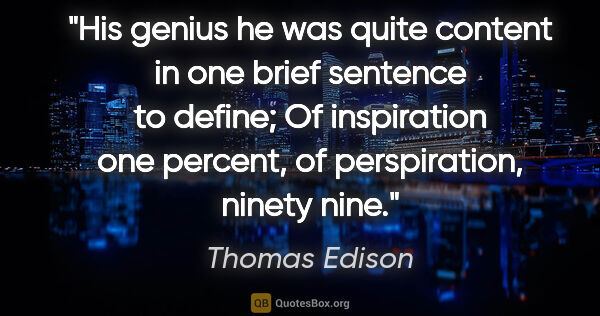One Sentence Quotes (page 2)
We're pupils of the religions—Catholic, Protestant, Jewish . . . Well, the Christian religions. Those who directed French education down through the centuries were the Jesuits. They taught us how to make sentences translated from the Latin, well balanced, with a verb, a subject, a complement, a rhythm. In short—here a speech, there a preach, everywhere a sermon! They say of an author, “He knits a nice sentence!” Me, I say, “It's unreadable.” They say, “What magnificent theatrical language!” I...
Louis-Ferdinand Celine
We got through all of Genesis and part of Exodus before I left. One of the main things I was taught from this was not to begin a sentence with And. I pointed out that most sentences in the Bible began with And, but I was told that English had changed since the time of King James. In that case, I argued, why make us read the Bible? But it was in vain. Robert Graves was very keen on the symbolism and mysticism in the Bible at that time.
Stephen Hawking
I remember one English teacher in the eighth grade, Florence Schrack, whose husband also taught at the high school. I thought what she said made sense, and she parsed sentences on the blackboard and gave me, I'd like to think, some sense of English grammar and that there is a grammar, that those commas serve a purpose and that a sentence has a logic, that you can break it down. I've tried not to forget those lessons, and to treat the English language with respect as a kind of intricate tool.
John Updike
Do not put statements in the negative form. And don't start sentences with a conjunction. If you reread your work, you will find on rereading that agreat deal of repetition can be avoided by rereading and editing. Never use a long word when a diminutive one will do. Unqualified superlatives are the worst of all. De-accession euphemisms. If any word is improper at the end of a sentence, a linking verb is. Avoid trendy locutions that sound flaky. Last, but not least, avoid cliches like the plague.
William Safire
The most interesting thing about writing is the way that it obliterates time. Three hours seem like three minutes. Then there is the business of surprise. I never know what is coming next. The phrase that sounds in the head changes when it appears on the page. Then I start probing it with a pen, finding new meanings. Sometimes I burst out laughing at what is happening as I twist and turn sentences. Strange business, all in all. One never gets to the end of it. That’s why I go on, I suppose....
Gore Vidal

I feel sick when I look at the parody synopsis, at the letters from the film company... The novel is 'about' a colour problem. I said nothing in it that wasn't true. But the emotion it came out of was something frightening, the unhealthy, feverish illicit excitement of wartime, a lying nostalgia, a longing for licence, for freedom, for the jungle, for formlessness. It is so clear to me that I can't read that novel now without feeling ashamed, as if I were in a street naked. Yet no one else...
Doris Lessing
Creation, whether it's writing, painting or whatever, is essentially despotic and autocratic in nature, because it's the work of one mind and one mind alone which has absolute power of life or death over this sentence, or that phrase or whatever it is. It brooks no interference and can only work if it's the one mind doing it. Reading, on the other hand, interpretation, is inherently, intrinsically democratic, because it is fundamentally a process of negotiation between the mind and the text,...
Philip Pullman
The problem is, or rather one of the problems, for there are many, a sizeable proportion of which are continually clogging up the civil, commercial, and criminal courts in all areas of the Galaxy, and especially, where possible, the more corrupt ones, this. The previous sentence makes sense. That is not the problem. This is: Change. Read it through again and you'll get it.
Douglas Adams

Legally, Moosbrugger's case could be summed up in-a sentence. Hewas one of those borderline cases in law and forensic medicineknown even to the layman as a case of diminished responsibility. These unfortunates typically suffer not only substandard healthbut also have a substandard disease, Nature has a peculiar prefer-ence for producing such people in droves. Natura non fecit saltus, she makes no jumps but prefers gradual transitions; even on thegrand scale she keeps the world in a...
Robert Musil
